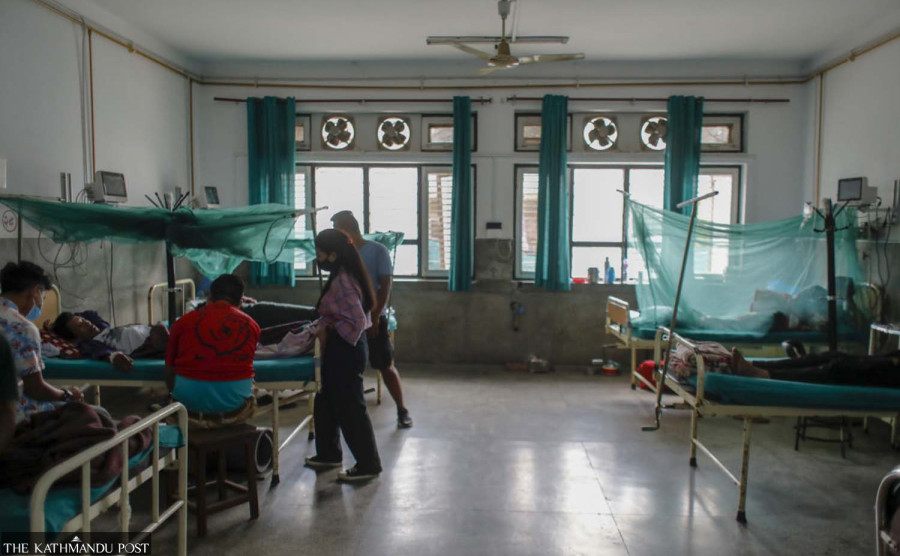Health
Dengue spread to continue for next two weeks
Health Ministry asks local units to continue search-and-destroy drives and the public to keep their houses and surroundings clean during Tihar.
Post Report
Although new cases of dengue infection have gone down following a decline in temperatures of late, the Ministry of Health and Population said that the risk of infection continues to persist and will do so for the next several days.
With the onset of post-monsoon, which is considered a high transmission period for the dengue virus, officials asked all agencies concerned and the general public to follow proper safety measures.
“We think that infection of dengue virus could continue for the next two weeks,” said Dr Roshan Pokhrel, secretary at the Ministry of Health and Population. “As preventive measures have not been very effective, people should also try to avoid infection.”
Dengue is a mosquito-borne disease transmitted by female Aedes aegypti and Aedes albopictus mosquitoes. The same vector also transmits chikungunya, yellow fever, and Zika viruses, according to the World Health Organisation.
Post-monsoon is considered a high transmission season for dengue but Nepal has witnessed outbreaks of the deadly disease since the beginning of the year and in the pre-monsoon and monsoon seasons as well.
This year's monsoon ended on October 16.
At least 52 have died and 43,685 people have tested positive for the dengue virus so far this year—a single-year record. Experts say reported cases of dengue could be just the tip of the iceberg, as around 90 percent of the infected people are asymptomatic. Many people infected with dengue have not been seeking hospital care, which is also the reason for the decline in reported cases, doctors say.
Those closely tracking the cases suspect many more people could have succumbed to the disease as not all deaths are reported. Officials at the Health Ministry concede as much.
Despite the deaths of dozens of people and thousands getting infected, no proper measure has been taken to contain the spread of the virus.
The Epidemiology and Disease Control Division had recommended that the Health Ministry declare a dengue epidemic in the country, but ministry officials refused, arguing infections would naturally decline with a dip in temperatures.
The division had also recommended spraying insecticides and carrying out search-and-destroy drives, among other measures, to contain the contagion. But except for counting the number of deceased and infected people, nothing substantial was done, public health experts said. This led to an unchecked spread of the disease across the country.
Though the federal government asked local units to carry out fogging in their areas, there was no monitoring to check for local units’ compliance with the directive. Dengue virus is killed by fogging; the spraying needs to continue until the risk goes away.
But many local units had expressed their inability to carry out mosquito search-and-destroy drives citing a lack of funds for the task.
Meanwhile, the Epidemiology and Disease Control on Sunday met representatives of local units and urged officials to continue the search-and-destroy drive during Tihar.
“We have also asked local units to prepare a plan to carry out regular search-and-destroy drives,” said Dr Chuman Lal Das, director at the division.
The division said that Aedes aegypti and Aedes albopictus mosquitoes are responsible for the ongoing spread of the dengue virus. Likewise, serotypes 1 and 3 of the dengue virus have been spreading at present.
According to Das, serotyping was done on 12 blood samples of infected people at BP Koirala Institute of Health Sciences, and of them, seven samples were found responsible for serotype 1 and five for serotype 3.
Officials ask the public to keep their houses and surroundings clean as Aedes aegypti mosquitoes live both indoors and outdoors while Aedes albopictus mosquitoes live outdoors.




 9.89°C Kathmandu
9.89°C Kathmandu














